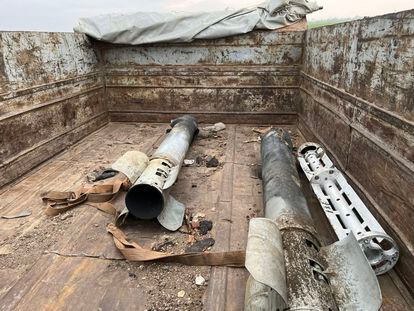Russian soldiers guard a wheat field in the Zaporizhia region, occupied by Moscow's troops, on August 11. AP
The agricultural sector in Ukraine still fears war.
The director of operations of Agrio-Region, Volodímir Kravtsov, 42, asks first of all that, at the request of the security services, his cultivation fields are not located in this article.
So be it;
suffice it to say that they are on some piece of land in the greater kyiv region.
"In Ukraine," explains Kravtsov, "they have fired high-precision missiles at elevators."
For the little savvy in the matter, these elevators are the most pampered jewel of an agricultural production.
The grain arrives there, is weighed, cleaned, dried and preserved before leaving for the buyer.
But here, in this outing, is the deepest wound that the Russian military campaign has opened in the countryside.
The blockade of the southwestern ports, which lead to the Black Sea, paralyzed the transport of Ukrainian grain,
the country's main export item.
The unblocking now thanks to the agreement reached in July separately between Ukraine and Russia with the measure of Turkey seemed to clear the way, but only for a few.
"We cannot now finance transportation through Odessa", explains Kravtsov, "only the large owners of the port terminals that they built to serve their companies can do it".
And that Agro-Region is not small.
It cultivates 40,000 hectares in the central zone of the country.
Corn, wheat, sunflowers, barley, rapeseed... "We were among the most efficient, then the rest came," says this director of operations.
It means that when the Russian troops began to hinder the exit to the south through the Black Sea, with the control of some ports and a flotilla of twenty frigates in the waters, this company turned to the southwest and sent its trucks towards the Danube.
A good idea, but not without problems: first, because both this and most Ukrainian agricultural companies used to load trains, with a large capacity (3,500 tons in one trip), before the war, in direction, by 90% of the occasions, to the ports of the south of the country.
More information
Last minute of the war in Ukraine, live
Now moving the grain to the border with Romania, which marks the course of the Danube to its mouth, makes it necessary to use trucks - Ukraine does not share the rail gauge with the rest of Europe - with a much more limited capacity (22 tons per trailer), and arm yourself with patience because the ports there do not have the magnitude and operability of one like Odessa, to give an example.
Not even the borders are capable of absorbing that amount of transport, with truck queues, for example, of up to 20 kilometers at the Krakovets-Korczowa crossing towards Polish territory.
Agriculture is the first pillar of the Ukrainian economy, which has about 41 million hectares for cultivation.
In 2019, the last year of some stability, it produced 74 million tons of grain.
It is among the main exporters of corn and wheat -especially to regions with great dependence on these cereals, but also vulnerability due to the health of their economies, such as the Middle East and the African continent-, but, in addition, the vast fields of sunflowers place to the country at the head in world export of the oil that gives its seeds.
It is for all this that farmland has been a target of war and its employees, too.
Shell debris collected in one of the Agro-Region fields east of kyiv.
Kravtsov used to say that you attack with precision weapons and here is a sample: on July 31, a missile crossed Oleksii Vadaturskii's bedroom during a strong Russian offensive in Mikolaiv, in the south of the country.
Vadaturskii was the owner of Nubilon, one of the largest Ukrainian agricultural companies, the kind that have ships and a shipyard.
Such is the relevance of this businessman, that he died together with his wife, that the country's president, Volodímir Zelenski, dedicated a few words to him during one of his communications.
The corn crops are green and very tall, although the harvest will not take place until the end of September or even October.
Sunflowers, slender in the shelter of the green leaf, look formidable at this time.
Yurii Lisak, chief agronomist of Agro-Region, drives to the land that not so long ago saw almost more projectiles than seeds.
There are still walls of sandbags along the road - for what may come, they say - and signs of mines on the margins.
“In that grove,” says Lisak, 41, “our tanks were hiding;
They went out to shoot and went back in.”
He shows the photos of the shell debris they found in the crops.
With the help of the Ukrainian military, they removed the remains and returned to the pit.
Two plows and a cultivator are now working to receive the new seed.
According to data provided to EL PAÍS by the UCAB agricultural association, which brings together the large companies in the sector in Ukraine, there are currently around 18.5 million tons of grain blocked due to the Russian offensive.
The problems are innumerable: if it doesn't hit the market, there is no final sale, but it also serves as a buffer for the next harvest.
The drop in exports, from about six million tons a month before the war to 2.5 million now, cannot be absorbed by the domestic market, which only needs 19 million tons of grain a year.
And if there is no sale abroad, the food security of so many countries dependent on cereals falters.
On July 22, the Russian and Ukrainian negotiators signed agreements with Turkey under the auspices of the UN Secretary General.
Since then, around twenty freighters have left the ports of the south-west of the country for the Black Sea.
“Unblocking solves the current problems of exporting grain from the previous harvest already contracted by large sellers”, explains the Ukrainian economist Oleksii Kushch, “already paid for and stored in port terminals”.
"Indirectly", continues this expert, "the unloading of these terminals will also facilitate the logistics of the current harvest, but more in the long term".
According to this economist, the very valuable agrarian sector in Ukraine needs two things:
that the State buy grain to help the small ones and promote in parallel the processing of products to give them another value.
This is, for example, flour instead of grain.
Meanwhile, in companies like the one that Volodímir Kravtsov operates, they squeeze their heads to be the most creative in logistics and finance, and reach Romania, Poland or Lithuania.
If you have to ask for a loan - now they spend five times more on transportation than before - ask for it, although the guarantee is the grain and if it is not sold... Layoffs in Agro-Region are few, but another thing, acknowledges this director of operations , it will be next season, if they don't manage to sell the harvest.
"There will be companies that do not arrive," he admits.
"Do you feel frustrated?"
“It pisses us off when you talk about peace negotiations.
Difficulties do not scare us, until the end of the year we will resist.
The best we can do is drive the Russians off our land and the rest will be taken care of.
Follow all the international information on
and
, or in
our weekly newsletter
.
50% off
Subscribe to continue reading
read without limits
Keep reading
I'm already a subscriber






